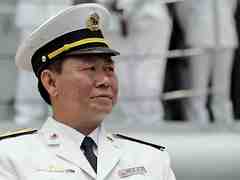 Within hours of Japan's announcement that Chinese ships had locked fire-control radar on Tokyo forces last month, Beijing denied the event occurred at all.
Within hours of Japan's announcement that Chinese ships had locked fire-control radar on Tokyo forces last month, Beijing denied the event occurred at all.The New York Times Friday ran China's denial:
... the Defense Ministry Web site said that the naval vessels’ radar had “maintained normal observational alertness, and there was no use of fire-control radar.” It did not explain what it meant by “normal observational alertness,” though the ministry added that the Japanese claims were “out of step with the facts.”
Denny Roy, a senior fellow at the East-West Center in Honolulu who researches security issues says. “I think it’s a positive development that the Chinese would deny doing this, as opposed to saying, ‘Yes we did it, and we’ll do it again,.'"“For the Chinese to not want to be portrayed as an aggressor, I think, is a good sign.”
Others don't agree and see the confrontation, then backing away, as part of China's design to snare Japan into open conflict. Either way, Japan says the debate on whether it happened may be put to rest with the release of its radar documentation.
From the BBC:
Tokyo said it might release the data after Beijing rejected accusations it had targeted the destroyer last month.
"The government is considering the extent of what can be disclosed," Kyodo news agency quoted Japanese Defence Minister Itsunori Onodera as saying.
The Chinese Foreign Ministry originally responded to the allegations by saying it hadn't heard about the engagements until word of the events appeared on international news. It has since said the event didn't happen and is a total Japanese fabrication. Whether it's true or not, China is using Japan's claim as evidence Tokyo is preparing for war.
If Chinese ships did engage their fire-control radar, it may be in Beijing's interest to deny it because either it approved the maneuver or the ship's captains acted independently—and both scenarios offer a long list of concerns that would be easiest for China to address if avoided entirely.
Japan continues pressing the issue and yesterday announced that the use of fire-control radar against its ships is an "act of force" and a direct UN charter violation."
So if Tokyo releases this data, then it may be the the first official skirmish between the two countries as they feud over islands in the East China Sea.
*SEE ALSO: How Israel's Iron Dome really works >*
*SEE ALSO: The military vehicle that drives through major IED blasts unscathed *
*SEE ALSO: Military & Defense Facebook Page*
Please follow Military & Defense on Twitter and Facebook.
Join the conversation about this story » Reported by Business Insider 1 day ago.